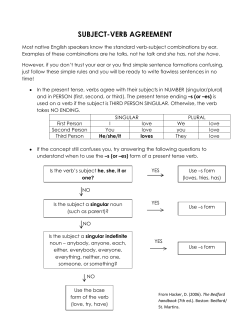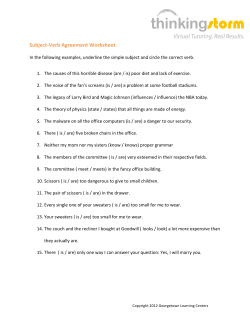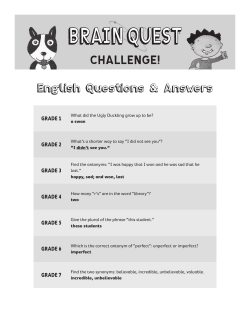
Document 39133
Notes and Exercises A sentence is made up of three parts. •SUBJECT: What or whom the sentence is about. •VERB: What the subject did or is. •The REST: Everything else in the sentence. EXAMPLES Rachel talks on the phone during her break. Karen types on her computer every day. Iris changes her clothes to suit the weather. The private investigator is below average. NOW, WHEN YOU ARE WRITING IN PRESENT TENSE, YOUR SUBJECT AND VERB MUST AGREE. Subjects and verbs must agree in the following way: SINGULAR subjects require SINGULAR verbs. PLURAL subjects require PLURAL verbs. Examples Rachel understands the process very well. The students understand the process very well. Jared calls his manager every day. The employees call their manager every day. DID YOU SEE THAT? SINGULAR VERBS end with –s PLURAL VERBS don’t end with s? Some pronouns are singular. Someone Somebody Something Another Anybody Anyone Anything Nobody No one Nothing Everybody Everyone Everything Either Neither Each Much One Some pronouns are plural. Few Both Several Many Other 1. 2. 3. 4. Few students miss calculus lectures on Monday. Several students know the answer. Many are already raising their hands. Others have not read the chapter. Some pronouns can be either singular or plural. Some All Most None Half of EXAMPLES Underline the subject and verb in each sentence. Label the following sentences as S for singular or P for plural. 1. Some of the meat is spoiled. 2. Some of the cookies have been eaten. 3. Most of the money is still in the safe. 4. Most of the coins have been stolen. 5. None of the cheerleaders are happy. 6. Half of the assignments are late. Be careful, the subject of your sentence can NEVER be in a PREPOSITIONAL PHRASE. Check Your Answers Underline the subject and verb in each sentence. Label the following sentences as S for singular or P for plural. 1. Some of the meat is spoiled. S 2. Some of the cookies have been eaten. P 3. Most of the money is still in the safe. S 4. Most of the coins have been stolen. P 5. None of the cheerleaders are happy. P 6. Half of the assignments are late. P Be careful, the subject of your sentence can NEVER be in a PREPOSITIONAL PHRASE. Exercise Identify the subject of the sentence by underlining it once. Then underline the correct verb for that subject. 1. Somebody (move, moves) my morning paper nearly every morning. 2. Both (argue, argues) on the phone. 3. Some pizza (has, have) been saved for later. 4. Half of the answers (was, were) correct. 5. Half of the assignment (is, are) already complete. 6. Most of the ice (melt, melts) in the spring. 7. Neither of the employers who interviewed me last week (has, have) called with the results of their interviews. 8. A small group of parents (hope, hopes) to meet Sunday to discuss travel arrangements for their seniors touring Southeast Asia in the fall. CHECK YOUR ANSERS Identify the subject of the sentence by underlining it once. Then underline the correct verb for that subject. 1. Somebody (move, moves) my morning paper nearly every morning. 2. Both (argue, argues) on the phone. 3. Some pizza (has, have) been saved for later. 4. Half of the answers (was, were) correct. 5. Half of the assignment (is, are) already complete. 6. Most of the ice (melt, melts) in the spring. 7. Neither of the employers who interviewed me last week (has, have) called with the results of their interviews. 8. A small group of parents (hope, hopes) to meet Sunday to discuss travel arrangements for their seniors touring Southeast Asia in the fall. REFINING YOUR UNDERSTANDING The subject of your sentence can NEVER be in a PREPOSITIONAL PHRASE. A prepositional phrase provides additional information. It is not essential to the meaning of the sentence. The little girl along with her mother laughs at the crazy clown. The CEO with several key members of his staff decides on the policies of the company. Each of the reports identifies multiple areas in need of improvement. CONJUNCTIONS! AND This is the only conjunction that can make your subject COMPOUND and PLURAL. The little girl AND her mother laugh at the crazy clown. The CEO AND several key members of his staff decide on the policies of the company. Either or Neither nor These are called CORRELATIVE CONJUNCTIONS. They can make your subject SINGULAR or PLURAL. Neither the students nor the teacher knows the policy. Neither the teacher nor the students know the policy. CORRELATIVE CONJUNCTIONS Either or Neither nor Not only but also REMEMBER THIS! These correlative conjunctions ARE NOT the subject of your sentence. They are simply the FRAMEWORK for a COMPOUND SUBJECT. The subject CLOSEST to the verb DETERMINES THE NUMBER OF THE VERB! THERE and HERE are ADVERBS. They can NEVER BE THE SUBJECT OF YOUR SENTENCE. There are fourteen CHAPTERS left to read. Here is the RECIPE I promised you. There at the piano (was, were) my grandmother along with the guest performer singing show tunes. There (is, are) a headphone set in each of the language labs in the basement of the English building. Exercise Identify the subject of the sentence by underlining it once. Then underline the correct verb for that subject. 1. Evidently, neither of the professors (is, are) aware that the letter of complain (has, have) been linked to him. 2. Either her brother or her parents (has, have) Leah’s address in California. 3. There in the middle of the aisle (was, were) my abandoned cart along with all of the items I had intended to purchase. 4. It should be perfectly clear by now that all of us (do, does) not agree with the motion as it stands now. 5. My mother and my best friend (has, have) often discussed the practicality of educating children at home. 6. Somebody (leaves, leave) (his, their) computer on after work, and I intend to discover who that it. 7. Every Fourth of July, every car and truck in town (lines, line) up along the waterfront for the annual fireworks display. CHECK YOUR WORK Identify the subject of the sentence by underlining it once. Then underline the correct verb for that subject. 1. Evidently, neither of the professors (is, are) aware that the letter of complain (has, have) been linked to him. 2. Either her brother or her parents (has, have) Leah’s address in California. 3. There in the middle of the aisle (was, were) my abandoned cart along with all of the items I had intended to purchase. 4. It should be perfectly clear by now that all of us (do, does) not agree with the motion as it stands now. 5. My mother and my best friend (has, have) often discussed the practicality of educating children at home. 6. Somebody (leaves, leave) (his, their) computer on after work, and I intend to discover who that it. 7. Every Fourth of July, every car and truck in town (lines, line) up along the waterfront for the annual fireworks display. STRENGTHENING YOUR UNDERSTANDING #1 EVERY This adjective can change the number of your compound subject. Every man, woman, and child attends the Fourth of July parade. Every Monday, Wednesday, and Friday is a long day for Lucinda. Even though your subjects are compound (and plural), EVERY separates each one and makes your subject singular. STRENGTHENING YOUR UNDERSTANDING #2 Relative Pronouns Remember relative pronouns? They introduce adjective clauses, which are used to describe nouns and pronouns. COPIES of the report that was completed by Schultz and Greenway WERE delivered to every board member by 8:00 the following morning. Notice that the relative pronoun is SINGULAR or PLURAL depending upon the word it modifies. Since the relative pronoun “that” refers to “report,” THAT is singular and requires the singular verb WAS. Exercise Identify the subject of the sentence by underlining it once. Then underline the correct verb for that subject. 1. Either the tests or the papers (has, have) been misplaced. 2. Every man, woman, and child (wants, want) Clint Eastwood’s autograph. 3. The employees who (offers, offer) the best suggestions will receive a week’s paid trip to Hawaii. 4. Those individual sourdough pizzas, my dad’s specialty and a Friday night favorite at our house, (is, are) not to be found at any fast food restaurant. 5. Before the final number of the evening, some of the orchestra’s retired members (was, were) asked to come to the stage and join in the orchestra’s signature piece. 6. Please pass this memo on to the first person who (receives, receive) a prank phone call. 7. The executive committee (plans, plan) to call for the director’s resignation within the week. 8. Somewhere in the office (is, are) the original and one clean copy of my report. 9. Each of the sweaters she had bought on sale (has, have) minor flaws. CHECK YOUR WORK Identify the subject of the sentence by underlining it once. Then underline the correct verb for that subject. 1. Either the tests or the papers (has, have) been misplaced. 2. Every man, woman, and child (wants, want) Clint Eastwood’s autograph. 3. The employees who (offers, offer) the best suggestions will receive a week’s paid trip to Hawaii. 4. Those individual sourdough pizzas, my dad’s specialty and a Friday night favorite at our house, (is, are) not to be found at any fast food restaurant. 5. Before the final number of the evening, some [of the orchestra’s retired members] (was, were) asked to come to the stage and join in the orchestra’s signature piece. 6. Please pass this memo on to the first person who (receives, receive) a prank phone call. 7. The executive committee (plans, plan) to call for the director’s resignation within the week. 8. Somewhere in the office (is, are) the original and one clean copy of my report. 9. Each of the sweaters she had bought on sale (has, have) minor flaws.
© Copyright 2025





















